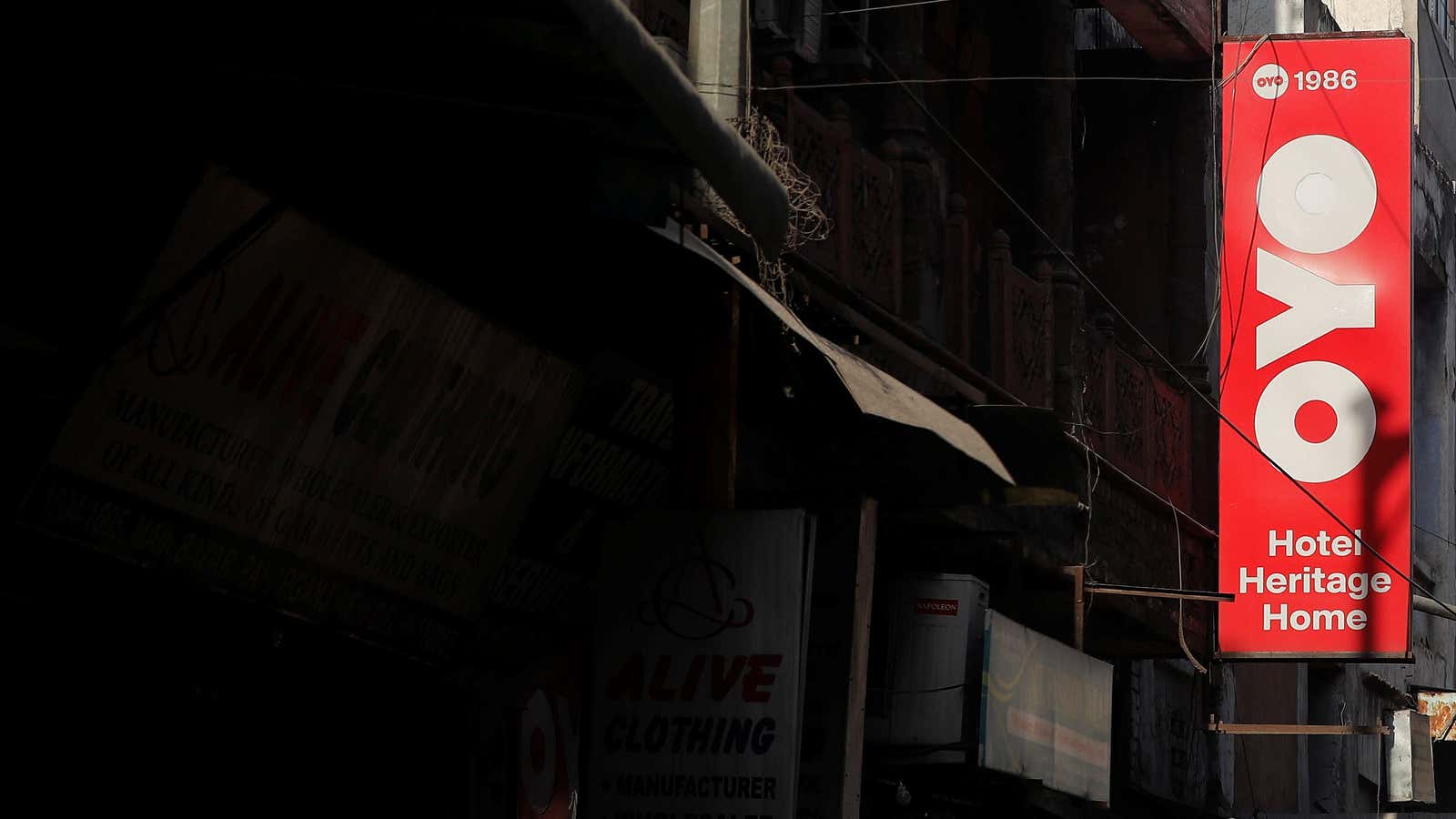This story has been updated with further comment from Oyo.
Indian startup Oyo’s woes are deepening in China, where the deadly coronavirus has taken a heavy toll on the country’s tourism and hotel industry.
The budget hotel chain plans to lay off about 30% of its China workforce, or some 3,000 employees. The cuts in China are part of a global layoff of about 5,000 people that will reduce Oyo’s headcount to 25,000, Bloomberg reported yesterday.
This is “in line” with a vast restructuring plan Oyo announced in January, a company spokesperson said in an email.
“China is a home market for Oyo, and we will continue working with our thousands of retained OYOpreneurs to deliver against our core mission of creating quality living experiences for millions of middle-income people around the world,” the spokesperson said. “During the tough Coronavirus situation, we will continue to support the benevolent and resilient Chinese society, in every possible way.”
The coronavirus, which has killed more than 3,000 in China (link in Chinese), has led to flight prices being slashed and hotel occupancy rates plunging in the country since late January, when China acknowledged the outbreak for the first time. “In China, the coronavirus has hit us and in specific provinces, we are trying hard to keep hotels open, as many as possible,” Oyo founder and CEO Ritesh Agarwal told Bloomberg. “It’s a tough time for our hotel partners.”
The next WeWork?
Founded in 2013, Oyo is effectively a hotel franchise. It finds budget hotels with little visibility or online presence, then renovates and refurbishes them to operate under the Oyo brand.
The company is widely thought to be the new crown jewel in the $100 billion SoftBank Vision Fund portfolio, following the failed IPO and meltdown of office-rental company WeWork. Oyo was valued late last year at $10 billion in a $1.5 billion funding round whose sole participants were its 26-year-old founder, Agarwal, and the Vision Fund.
Oyo followed a popular startup playbook and expanded aggressively, first in its home country of India and later to China, the UK, and the US. The company’s audacity and its young founder endeared it to SoftBank chief Masayoshi Son, who boasted last year that Oyo was growing 10 times faster than Marriott, the world’s largest hotel chain. Like most high-flying startups, Oyo isn’t profitable. The company reported a $335 million loss in 2019 on $951 million in revenue. Oyo said around 75% of those losses came from China and other international markets.
Skeptics now believe Oyo is overstretched and could be the next domino to fall in the ill-fated Vision Fund portfolio. So far this year, Oyo has already made deep cuts to its workforce in India and China, as well as reducing staff levels in the UK and the US. Companies backed by SoftBank, many of which received substantial financing to fuel rapid growth, have cut more than 10,000 jobs since June 2019.
Of Oyo’s China staff, around half of its 6,000 direct full-time employees will be let go. Oyo employs another 4,000 so-called discretionary staff who work at call centers and in hotels, a portion of whom will also be temporarily suspended until business picks back up, Bloomberg reported.
A former employee at Chinese budget hotel chain Qianyu Islands, which was acquired by Oyo (link in Chinese) last year, told Quartz that Qianyu has not paid their and several other colleagues’ January and February salaries. “Oyo told us to talk to HRs at Qianyu, all of whom have quit their jobs already. We did not receive any prior notice of termination from Qianyu or Oyo, and only realized that we were probably fired when we did not get our January salary last month,” said the employee.
“We provide a unified and reasonable compensation plan to all OYO employees in accordance with relevant national laws and regulations. The restructuring exercise will be closed in the next couple of days,” a spokesperson from Oyo’s China headquarters said in response to accusations by some former employees that it delayed payment of salaries.
“Oyo, get out of China”
Even before the coronavirus outbreak, some of Oyo’s Chinese operators were unhappy with the company. Oyo signed up some hoteliers by guaranteeing them a certain amount of monthly revenue, regardless of how many guests they booked. Lately, Oyo has reportedly slashed those guarantees, angering its hotel operators, some of whom have protested outside Oyo’s China headquarters in Shanghai, demanding compensation for lost income and telling the company to “get out of China” (link in Chinese.)
Oyo entered the China market in November 2017. The company says on its website that it had signed up 19,000 hotels (link in Chinese) in 2,000 Chinese cities and provinces as of last December, which it said made it China’s second-largest hotel chain.
Similar to how it operates in India, Oyo in China partners with low-cost hotels, refurbishes them, and provides services like listings on its app and website, in exchange for a cut of their revenues. Oyo has said its exact business model varies between hotels and by market: in some cases it takes a cut of revenue, in others it charges performance-based fees to the hotelier.
Oyo introduced the revenue guarantees in China last June in a bid to accelerate growth and fend off fierce competition from other Chinese hotel chains. Oyo said it would guarantee monthly income to hotels if it could set their room rates, among other requirements, and only take a commission on the share of revenue that exceeded the guarantee.
The scheme helped attract hoteliers, but many have since complained that Oyo under-prices rooms to increase occupancy, according to Sina Tech. Some operators also say the company has changed the commission-free amount it guarantees without notice.
The company has previously said it doesn’t expect to turn a profit in India or China until 2022. But last month, those plans were probably placed on ice when, with losses jumping and coronavirus spreading, Oyo said that it was pausing expansion.
